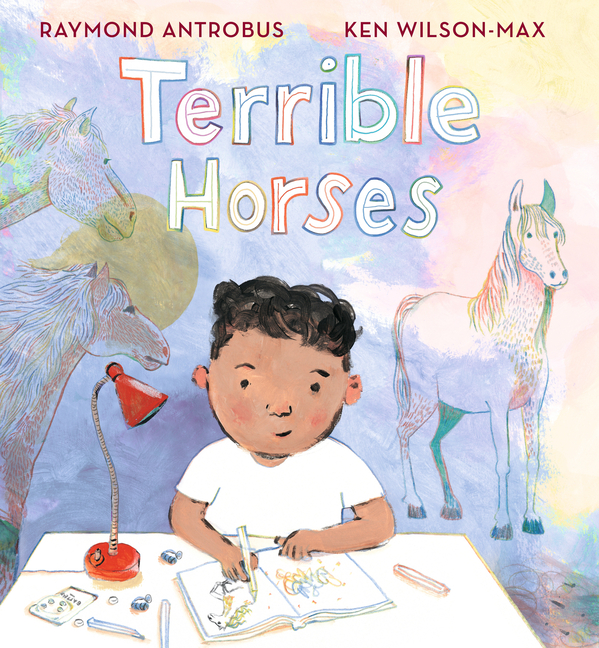Book Descriptions
for Terrible Horses by Raymond Antrobus and Ken Wilson-Max
From Cooperative Children's Book Center (CCBC)
A young, brown-skinned boy wants to share his big sister’s toys, and her friends. Instead, the two of them fight. “Push Pull Hurt Hide. We do not use our words.” The boy, who wears hearing aids, takes refuge in his room and writes stories about “terrible horses.” “In the stories, I am a pony. Everyone else in the world is a horse … It is lonely being a pony.” The sibling discord continues and so, too, do his stories about “ghastly, galloping,” “nagging, neighing” horses. “I write about the pony that can’t compete / that can’t speak / that can’t sleep.” Then his sister finds his book of stories. She smiles “a whole smile.” She says sorry. “She never says sorry.” She offers a hug. He wonders what she saw in his stories. He wonders, “Is she a terrible horse? Or a pony?” A spare yet emotionally rich text explores the pain of the boy’s feelings of disconnect and isolation, the power he finds in creative expression, and the solace of a hopeful (re)connection. Uncluttered mixed-media illustrations anchor the story’s feelings and actions with images that show the two siblings and the boy’s imagined world. The boy’s concluding, open-ended questions are a wonderful invitation to young readers and listeners to consider what, if anything, has changed, and why.
CCBC Choices 2025. © Cooperative Children's Book Center, Univ. of Wisconsin – Madison, 2025. Used with permission.
From the Publisher
In a relatable tale about two siblings at constant odds, a child discovers that expressing himself through stories can help resolve conflict and generate understanding.
My sister is cooler than me.
I want her friends to be my friends.
I want her things to be my things.
For one little boy and his older sister, fights are always waiting to happen--when he takes something without asking, jumps on her bed without asking, even wanders off without asking. And when they fight, they don't use words: it's all push, pull, hurt, hide. To cool off after, the boy retreats to his room to write and draw stories--stories about terrible horses trampling and galloping, while he is a lone pony unable to compete or speak or sleep. One morning, the boy wakes up to find his sketchbook missing, taken by his sister. What now? Will this make things worse, or could it help them to finally understand each other? With empathy and simplicity, Terrible Horses has much to say about using creativity to rein in anger, reflect, and see life through someone else's eyes.
My sister is cooler than me.
I want her friends to be my friends.
I want her things to be my things.
For one little boy and his older sister, fights are always waiting to happen--when he takes something without asking, jumps on her bed without asking, even wanders off without asking. And when they fight, they don't use words: it's all push, pull, hurt, hide. To cool off after, the boy retreats to his room to write and draw stories--stories about terrible horses trampling and galloping, while he is a lone pony unable to compete or speak or sleep. One morning, the boy wakes up to find his sketchbook missing, taken by his sister. What now? Will this make things worse, or could it help them to finally understand each other? With empathy and simplicity, Terrible Horses has much to say about using creativity to rein in anger, reflect, and see life through someone else's eyes.
Publisher description retrieved from Google Books.


